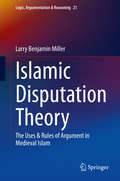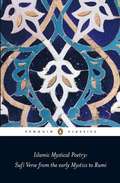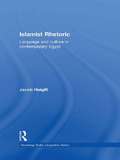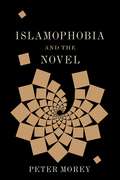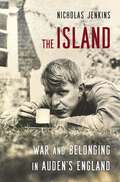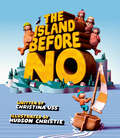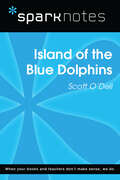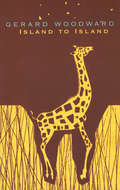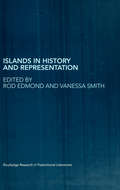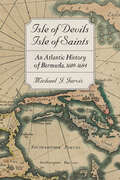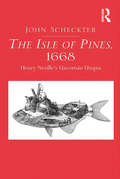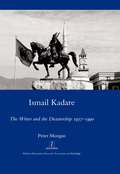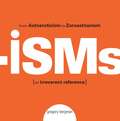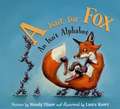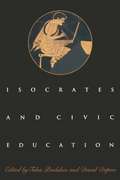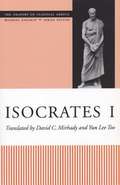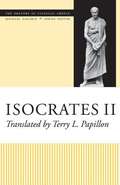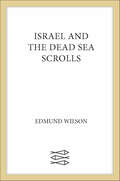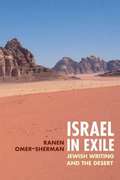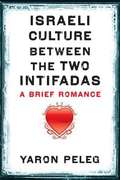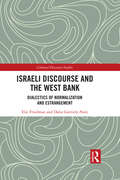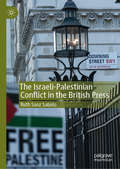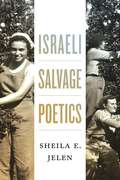- Table View
- List View
Islamic Disputation Theory: The Uses & Rules of Argument in Medieval Islam (Logic, Argumentation & Reasoning #21)
by Larry Benjamin MillerThis book charts the evolution of Islamic dialectical theory (jadal) over a four-hundred year period. It includes an extensive study of the development of methods of disputation in Islamic theology (kalām) and jurisprudence (uṣūl al-fiqh) from the tenth through the fourteenth centuries. The author uses the theoretical writings of Islamic theologians, jurists, and philosophers to describe the conceptOverall, this investigation looks at the extent to which the development of Islamic modes of disputation is rooted in Aristotle and the classical tradition. The author reconstructs the contents of the earliest systematic treatment of the subject by b. al-Rīwandī. He then contrasts the theological understanding of dialectic with the teachings of the Arab Aristotelians–al-Fārābī, Avicenna, and Averroes. Next, the monograph shows how jurists took over the theological method of dialectic and applied it to problems peculiar to jurisprudence. Although the earliest writings on dialectic are fairly free of direct Aristotelian influence, there are coincidences of themes and treatment. But after jurisprudence had assimilated the techniques of theological dialectic, its own theory became increasingly influenced by logical terminology and techniques. At the end of the thirteenth century there arose a new discipline, the ādāb al-baḥth. While the theoretical underpinnings of the new system are Aristotelian, the terminology and order of debate place it firmly in the Islamic tradition of disputation.
Islamic Mystical Poetry: Sufi Verse from the Mystics to Rumi
by Mahmood JamalWritten from the ninth to the twentieth century, these poems represent the peak of Islamic Mystical writing, from Rabia Basri to Mian Mohammad Baksh. Reflecting both private devotional love and the attempt to attain union with God and become absorbed into the Divine, many poems in this edition are imbued with the symbols and metaphors that develop many of the central ideas of Sufism: the Lover, the Beloved, the Wine, and the Tavern; while others are more personal and echo the poet’s battle to leave earthly love behind. These translations capture the passion of the original poetry and are accompanied by an introduction on Sufism and the common themes apparent in the works. This edition also includes suggested further reading.
Islamist Rhetoric: Language and Culture in Contemporary Egypt (Routledge Arabic Linguistics Series)
by Jacob HoigiltIslamism in Egypt is more diversified in terms of its sociology and ideology than is usually assumed. Through linguistic analysis of Islamist rhetoric, this book sheds light upon attitudes towards other Muslims, religious authority and secular society. Examining the rhetoric of three central Islamist figures in Egypt today - Yusuf al-Qaradawi, Amr Khalid and Muhammad Imara - the author investigates the connection between Islamist rhetoric and the social and political structures of the Islamic field in Egypt. Highlighting the diversity of Islamist rhetoric, the author argues that differences of form disclose sociological and ideological tensions. Grounded in Systemic Functional Grammar, the book explores three linguistic areas in detail: pronoun use, mood choices and configurations of processes and participants. The author explores how the writers relate to their readers and how they construe concepts that are central in the current Islamic revival, such as ‘Islamic thought’, ‘Muslims’, and ‘the West’. Introducing an alternative divide in Egyptian public debate - between text cultures rather than ideologies - this book approaches the topic of Islamism from a unique analytical perspective, offering an important addition to the existing literature in the areas of Middle Eastern society and politics, Arabic language and religious studies.
Islamophobia and the Novel (Literature Now)
by Peter MoreyIn an era of rampant Islamophobia, what do literary representations of Muslims and anti-Muslim bigotry tell us about changing concepts of cultural difference? In Islamophobia and the Novel, Peter Morey analyzes how recent works of fiction have framed and responded to the rise of anti-Muslim prejudice, showing how their portrayals of Muslims both reflect and refute the ideological preoccupations of media and politicians in the post-9/11 West.Islamophobia and the Novel discusses novels embodying a range of positions—from the avowedly secular to the religious, and from texts that appear to underwrite Western assumptions of cultural superiority to those that recognize and critique neoimperial impulses. Morey offers nuanced readings of works by John Updike, Ian McEwan, Hanif Kureishi, Monica Ali, Mohsin Hamid, John le Carré, Khaled Hosseini, Azar Nafisi, and other writers, emphasizing the demands of the literary marketplace for representations of Muslims. He explores how depictions of Muslim experience have challenged liberal assumptions regarding the novel’s potential for empathy and its ability to encompass a variety of voices. Morey argues for a greater degree of critical self-consciousness in our understanding of writing by and about Muslims, in contrast to both exclusionary nationalism and the fetishization of difference. Contemporary literature’s capacity to unveil the conflicted nature of anti-Muslim bigotry expands our range of resources to combat Islamophobia. This, in turn, might contribute to Islamophobia’s eventual dismantling.
The Island: War and Belonging in Auden’s England
by Nicholas JenkinsA groundbreaking reassessment of W. H. Auden’s early life and poetry, shedding new light on his artistic development as well as on his shifting beliefs about political belonging in interwar England.From his first poems in 1922 to the publication of his landmark collection On This Island in the mid-1930s, W. H. Auden wrestled with the meaning of Englishness. His early works are prized for their psychological depth, yet Nicholas Jenkins argues that they are political poems as well, illuminating Auden’s intuitions about a key aspect of modern experience: national identity. Two historical forces, in particular, haunted the poet: the catastrophe of World War I and the subsequent “rediscovery” of England’s rural landscapes by artists and intellectuals.The Island presents a new picture of Auden, the poet and the man, as he explored a genteel, lyrical form of nationalism during these years. His poems reflect on a world in ruins, while cultivating visions of England as a beautiful—if morally compromised—haven. They also reflect aspects of Auden’s personal search for belonging—from his complex relationship with his father, to his quest for literary mentors, to his negotiation of the codes that structured gay life. Yet as Europe veered toward a second immolation, Auden began to realize that poetic myths centered on English identity held little potential. He left the country in 1936 for what became an almost lifelong expatriation, convinced that his role as the voice of Englishness had become an empty one.Reexamining one of the twentieth century’s most moving and controversial poets, The Island is a fresh account of his early works and a striking parable about the politics of modernism. Auden’s preoccupations with the vicissitudes of war, the trials of love, and the problems of identity are of their time. Yet they still resonate profoundly today.
The Island Before No
by Christina UssWhen a kid who can say NO visits an island of walruses who can only say YES, chaos ensues in this hilarious debut picture book. For fans of NO Is All I Know!When you're a walrus living on an island where the answer to every question is YES, life is pretty simple, especially when that's all you've ever known. It's great when you want a slice of birthday cake for breakfast . . . and not so great when someone asks you to wear an itchy shirt.But one day, a kid shows up, brandishing an entirely new word: NO. NO is heavy like a bookcase, solid as a boulder. It's not shaped like YES, but somehow, it's still an answer. The kid calls his friends to come visit the island too, and it's not long before they've eaten up all of the yummiest food without sharing. What's worse, none of them bring their own toothbrushes . . .It becomes clear that what the walruses all need is to find their own NO . . . not only to hold back the rampaging horde of children — but for their own sakes as well. The Island Before No is a hilarious new picture book that blends its zany fun with an important message about respecting and setting boundaries.
Island of the Blue Dolphins (SparkNotes Literature Guide Series)
by SparkNotesIsland of the Blue Dolphins (SparkNotes Literature Guide) by Scott O'Dell Making the reading experience fun! Created by Harvard students for students everywhere, SparkNotes is a new breed of study guide: smarter, better, faster. Geared to what today's students need to know, SparkNotes provides: *Chapter-by-chapter analysis *Explanations of key themes, motifs, and symbols *A review quiz and essay topicsLively and accessible, these guides are perfect for late-night studying and writing papers
Island To Island
by Gerard WoodwardIn Island to Island, his third collection of poetry for Chatto, Gerard Woodward ventures into more hostile, less familiar territory. An Arabian desert, the moon, thinly-populated archipelagos are all visited in what emerges as an investigation into the nature of social space. A giraffe trapper finds that a successful trap must closely resemble a giraffe's own home; the 'suburban glass' of starter-home conservatories glazes and crysallises the lives of newly-weds. With his characteristic exuberance and ability to stand the world on its head, Woodward combines tichly imagined poems about half-invented lands with poetry that transforms the ordinary into the fantastical, where baths become oceans and ceilings lunar landscapes. Nor is the body exempt from this exploration of borders and limits. In one poem, two 'gurning' contestants find that they've overstepped some boundary of humanness and in 'The Madness of Heracles', a long retelling of the myth of the twelve labours, human strength is put to the test in a poem which evolves into a rhapsody of love, loss, toil and redemption.
Islands in History and Representation (Routledge Research In Postcolonial Literatures Ser.)
by Rod EdmondThis innovative collection of essays explores the ways in which islands have been used, imagined and theorised, both by island dwellers and continentals. This study considers how island dwellers conceived of themselves and their relation to proximate mainlands, and examines the fascination that islands have long held in the European imagination. The collection addresses the significance of islands in the Atlantic economy of the eighteenth century, the exploration of the Pacific, the important role played by islands in the process of decolonisation, and island-oriented developments in postcolonial writing.Islands were often seen as natural colonies or settings for ideal communities but they were also used as dumping grounds for the unwanted, a practice which has continued into the twentieth century. The collection argues the need for an island-based theory within postcolonial studies and suggests how this might be constructed. Covering a historical span from the eighteenth to the twentieth century, the contributors include literary and postcolonial critics, historians and geographers.
Isle of Devils, Isle of Saints: An Atlantic History of Bermuda, 1609–1684 (Early America: History, Context, Culture)
by Michael J. JarvisHow can the small, isolated island of Bermuda help us to understand the early expansion of English America?First discovered by Europeans in 1505, the island of Bermuda had no indigenous population and no permanent European presence until the early seventeenth century. Settled five years after Virginia and eight years before Plymouth, Bermuda is a foundational site of English colonization. Its history reveals strikingly different paths of potential colonial development as a place where slave-owning puritan tobacco planters raised large families, engaged overseas markets, built ships, created a Christian commonwealth, hanged witches, wrestled to define racial difference, and welcomed godly pirates raiding Spanish America. In Isle of Devils, Isle of Saints, Michael J. Jarvis presents readers with a new narrative social and cultural history of Bermuda. Adopting a holistic, multidisciplinary approach that draws upon thirty years of research and archaeological fieldwork, Jarvis recounts Bermuda's turbulent, dynamic past from the Sea Venture's dramatic 1609 shipwreck through the 1684 dissolution of the Bermuda Company. He argues that the island was the first of England's colonies to produce a successful staple, form a stable community, turn a profit, transplant civic institutions, and harness bound African knowledge and labor. Bermuda was a tabula rasa that fired the imaginations of English thinkers aspiring to create an American utopia. It was also England's first puritan colony, founded as a covenanted Christian commonwealth in 1612 by self-consciously religious settlers who committed themselves to building a moral society. By the 1670s, Bermuda had become England's most densely populated possession and was poised to become an intercolonial maritime hub after freeing itself from its antiquated parent company. The first scholarly monograph in eighty years on this important, neglected colony's first century, Isle of Devils, Isle of Saints is a worthy prequel to In the Eye of All Trade, Jarvis's masterful first book. Revealing the dynamic interplay of race, gender, slavery, and environment at the dawn of English America, Jarvis's work challenges us to rethink how Europeans and Africans became distinctly American within the crucible of colonization.
The Isle of Pines, 1668: Henry Neville's Uncertain Utopia
by John ScheckterA short fiction of shipwreck and discovery written by the politician Henry Neville (1620-1694), The Isle of Pines is only beginning to draw critical attention, and until now no scholarly edition of the work has appeared. In the first full-length study of The Isle of Pines, supported by the first fully critical edition, John Scheckter discloses how Neville's work offers a critique of scientific discourse, enacts complicated engagements of race and gender, and interrogates the methods and consequences of European exploration. The volume offers a new critical model for applying post-colonial and postmodern examination strategies to an early modern work. Scheckter argues that the structure and publication history of the fiction, with its separate, unreliable narrators, along with its several topics-shipwreck survival, the founding of a new society, the initial phases of European colonization-are imbued with the sense of uncertainty that permeated the era.
Ismail Kadare: The Writer and the Dictatorship 1957-1990
by Peter MorganIsmail Kadare has experienced a life of controversy. In his own country and internationally he has been both acclaimed as a writer and condemned as a lackey of the Albanian socialist dictatorship. Coming of age after occupation and war, Kadare (b. 1936) belonged to the first generation of new Albanians. In a land where writers were routinely imprisoned, Kadare produced the most brilliant and subversive works to emerge from socialist Eastern Europe. His work brings to an end the century whose literary beginnings were marked by the terror to which Kafka gave his name. The inaugural award of the International Man-Booker Prize for Literature in 2005 marked an important milestone in the global recognition of Kadare. Ironic, multi-layered and imaginative, Kadare's writing is profoundly opposed to ideology. Through critical analysis of a representative selection of Kadare's works, Peter Morgan explains for a wide audience how Kadare survived and wrote in the repressive Albanian Stalinist environment. Peter Morgan is Professor of European Studies at the University of Western Australia.
Isms
by Gregory BergmanIn the tradition of An Exaltation of Larks and Crazy English comes a book about words guaranteed to pique the interest of word lovers everywhere. From abolitionism to zoroastrianism, ISMs make up some of the most interesting, mysterious, and obscure words in the English language. In this entertaining, engaging, and enlightening little book, word lovers will discover the true meanings of these words--along with the often bizarre etymologies, mythologies, and the common and not-so-common usage behind them. This comprehensive book covers more than 200 of these intriguing ISMs.
Isms: From Autoeroticism to Zoroastrianism--an Irreverent Reference
by Gregory BergmanA Simon & Schuster eBook. Simon & Schuster has a great book for every reader.
Isms
by Gregory BergmanFrom abolitionism to Zoroastrianism, ISMs make up some of the most interesting, mysterious, and obscure words in the English language. This entertaining and engaging book covers more than 200 intriguing ISMs.
A Isn't for Fox: An Isn't Alphabet
by Wendy UlmerExperts know that sometimes the best way to teach a child what something is is to teach him what it isn't. Educator Wendy Ulmer applies that principle in her jaunty, out-of-the box alphabet A Isn't for Fox: An Isn't Alphabet. A isn't for box; it isn't for fox. A is for ants that crawl over your socks. Laura Knorr's colorful, engaging artwork perfectly captures the wit and whimsy behind the alphabet that isn't what it seems but is so much more!
Isocrates and Civic Education
by Takis Poulakos David DepewCivic virtue and the type of education that produces publicly minded citizens became a topic of debate in American political discourse of the 1980s, as it once was among the intelligentsia of Classical Athens. Conservatives such as former National Endowment for the Humanities chairman William Bennett and his successor Lynn Cheney held up the Greek philosopher Aristotle as the model of a public-spirited, virtue-centered civic educator. But according to the contributors in this volume, a truer model, both in his own time and for ours, is Isocrates, one of the preeminent intellectual figures in Greece during the fourth century B. C. In this volume, ten leading scholars of Classics, rhetoric, and philosophy offer a pathfinding interdisciplinary study of Isocrates as a civic educator. Their essays are grouped into sections that investigate Isocrates' program in civic education in general (J. Ober, T. Poulakos) and in comparison to the Sophists (J. Poulakos, E. Haskins), Plato (D. Konstan, K. Morgan), Aristotle (D. Depew, E. Garver), and contemporary views about civic education (R. Hariman, M. Leff). The contributors show that Isocrates' rhetorical innovations carved out a deliberative process that attached moral choices to political questions and addressed ethical concerns as they could be realized concretely. His notions of civic education thus created perspectives that, unlike the elitism of Aristotle, could be used to strengthen democracy.
Isocrates I
by David Mirhady Yun Lee TooThis is the fourth volume in the Oratory of Classical Greece series. Planned for publication over several years, the series will present all of the surviving speeches from the late fifth and fourth centuries B.C. in new translations prepared by classical scholars who are at the forefront of the discipline. These translations are especially designed for the needs and interests of today's undergraduates, Greekless scholars in other disciplines, and the general public. <P><P> Classical oratory is an invaluable resource for the study of ancient Greek life and culture. The speeches offer evidence on Greek moral views, social and economic conditions, political and social ideology, and other aspects of Athenian culture that have been largely ignored: women and family life, slavery, and religion, to name just a few.
Isocrates II
by Terry L. PapillonThis is the seventh volume in the Oratory of Classical Greece. This series presents all of the surviving speeches from the late fifth and fourth centuries BC in new translations prepared by classical scholars who are at the forefront of the discipline.<P><P> These translations are especially designed for the needs and interests of today's undergraduates, Greekless scholars in other disciplines, and the general public. <P> Classical oratory is an invaluable resource for the study of ancient Greek life and culture. The speeches offer evidence on Greek moral views, social and economic conditions, political and social ideology, law and legal procedure, and other aspects of Athenian culture that have been largely ignored: women and family life, slavery, and religion, to name just a few. The Athenian rhetorician Isocrates (436-338) was one of the leading intellectual figures of the fourth century. This volume contains his orations 4, 5, 6, 8, 12, and 14, as well as all of his letters. These are Isocrates' political works. Three of the discourses--Panathenaicus, On the Peace, and the most famous, Panegyricus--focus on Athens, Isocrates' home. Archidamus is written in the voice of the Spartan prince to his assembly, and Plataicus is in the voice of a citizen of Plataea asking Athens for aid, while in To Philip, Isocrates himself calls on Philip of Macedon to lead a unified Greece against Persia.
Israel and the Dead Sea Scrolls
by Edmund WilsonThe author of To the Finland Station and Axel's Castle brilliantly examines the significance of the scrolls' discovery and their role in Jewish history with this insightful biblical study, Israel and the Dead Sea Scrolls “Reading him, it is not difficult to imagine the ardor with which Edmund Wilson pursued his complex subject; it was the kind of subject he had always liked best, involving as it did history, politics, ancient lore, and all his faculties for imaginative reconstruction and historical analysis … No book quite like this has been written in our century.” —Leon Edel, from the introduction.
Israel in Exile: Jewish Writing and the Desert
by Ranen Omer-ShermanIsrael in Exile is a bold exploration of how the ancient desert of Exodus and Numbers, as archetypal site of human liberation, forms a template for modern political identities, radical skepticism, and questioning of official narratives of the nation that appear in the works of contemporary Israeli authors including David Grossman, Shulamith Hareven, and Amos Oz, as well as diasporic writers such as Edmund Jabès and Simone Zelitch. In contrast to other ethnic and national representations, Jewish writers since antiquity have not constructed a neat antithesis between the desert and the city or nation; rather, the desert becomes a symbol against which the values of the city or nation can be tested, measured, and sometimes found wanting. This book examines how the ethical tension between the clashing Mosaic and Davidic paradigms of the desert still reverberate in secular Jewish literature and produce fascinating literary rewards. Omer-Sherman ultimately argues that the ancient encounter with the desert acquires a renewed urgency in response to the crisis brought about by national identities and territorial conflicts.
Israeli Culture between the Two Intifadas: A Brief Romance
by Yaron PelegOver the past two decades, profound changes in Israel opened its society to powerful outside forces and the dominance of global capitalism. As a result, the centrality of Zionism as an organizing ideology waned, prompting expressions of anxiety in Israel about the coming of a post-Zionist age. The fears about the end of Zionism were quelled, however, by the Palestinian uprising in 2000, which spurred at least a partial return to more traditional perceptions of homeland. Looking at Israeli literature of the late twentieth century, Yaron Peleg shows how a young, urban class of Israelis felt alienated from the Zionist values of their forebears, and how they adopted a form of escapist romanticism as a defiant response that replaced traditional nationalism. One of the first books in English to identify the end of the post-Zionist era through inspired readings of Hebrew literature and popular media, Israeli Culture between the Two Intifadas examines Israel's ambivalent relationship with Jewish nationalism at the end of the twentieth century.
Israeli Discourse and the West Bank: Dialectics of Normalization and Estrangement (Cultural Discourse Studies Series)
by Elie Friedman Dalia Gavriely-NuriHow can irregular political situations, which impact the lives of millions, become normalized? Specifically, within the context of the Israeli-Palestinian conflict, how can 50 years of Israeli control over the Occupied Territories become accepted within Israeli society as a normal, possibly even banal phenomenon? Conversely, how can such a situation be estranged from daily reality, denied any relation to who "we" are? This volume explores these questions through the lens of two central discourses that dominate the Israeli debate regarding the future of the Occupied Territories: 1) Occupation Normalization Discourse, which portrays Israeli control of the territories as a "normal" part of life; 2) Occupation Estrangement Discourse, which portrays this situation as distant from Israeli reality. In addressing these discourses, the authors develop a new methodological tool, Dialectic Discourse Analysis, which examines discourse as a process of perpetual positing and synthesis of oppositions through the discursive construction, differentiation and mediation of self and other. Through this approach, the authors illustrate that these discourses are dialectically constituted in opposition to one another, feeding off one another, each enabling the other to exist. This dynamic has resulted in a fixed discourse, preventing any progress towards a synthesis of oppositions.
The Israeli-Palestinian Conflict in the British Press
by Ruth Sanz SabidoThe Israeli-Palestinian Conflict in the British Press provides an extensive empirical analysis of how the Israeli-Palestinian conflict has been constructed in British national newspapers since 1948. It traces the evolution of representations of the conflict by placing them in a historical context, with particular reference to Britain’s postcolonial relation to Palestine, and by presenting an in-depth analysis of the evolution of press language, including the use of terms such as ‘terrorism’ and ‘terrorist’ to classify agents of political violence. It applies an original approach to the study of media coverage, using a Postcolonial Critical Discourse Analysis framework, an innovative method that examines selected case studies in relation to theories of postcolonialism and discourse. Using this unique hybrid methodology, Sanz Sabido provides a thorough and precise unpicking of a highly mediated conflict.
Israeli Salvage Poetics
by Sheila E. JelenThrough thoughtful analysis of twentieth- and twenty-first-century Israeli literature, Israeli Salvage Poetics interrogates the concept of the "negation of the diaspora" as addressed in Hebrew-language literature authored by well-known and lesser-known Israeli authors from the eve of the Holocaust to the present day. Author Sheila E. Jelen considers the way that Israeli writers from eastern Europe or of eastern European descent incorporate pre-Holocaust eastern European culture into their own sense of Israeliness or Jewishness. Many Israelis interested in their eastern European legacy live with an awareness of their own nation’s role in the repression of that legacy, from the elevation of Hebrew over Yiddish to the ridicule and resentment directed at culture, text, and folk traditions from eastern Europe. To right the wrongs of the past and reconcile this conflict of identity, the Israeli authors discussed in this book engage in what Jelen calls "salvage poetics": they read Yiddish literature, travel to eastern Europe, and write of their personal and generational relationships with Ashkenazi culture. Israeli literary representations of eastern European Jewry strive, sometimes successfully, to recuperate eastern European Jewish pre-Holocaust culture for the edification of an audience that might feel responsible for the silencing and extinction of that culture.
